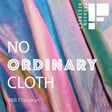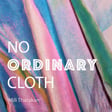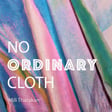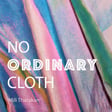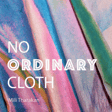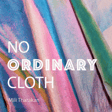
🌱 Ep 12. Strategies and Ecosystems for Fashion / Textile Startup Success with Brooke Roberts-Islam, Helene Steiner, Jim Ajioka (x Fashion District)
Special episode: No Ordinary Cloth x Fashion District
This is the first in a series of 6 episodes in collaboration with Fashion District, who are creating a hub for fashion innovation in east London. They connect fashion, technology, business and education to provide an ecosystem of support for fashion and textile startups that includes innovation networks, affordable space, business support and investment.
In this episode, Jim Ajioka (Colorifix), Helene Steiner (OpenCell), and Brooke Roberts-Islam (Techstyler) share their unique journeys and insights about navigating the intersections of science, fashion, and innovation. They discuss the importance of interdisciplinary collaboration, the challenges of transitioning from different fields, the necessity of understanding your industry's demand, and the crucial role of marketing and customer discovery. The conversation also covers the significance of personal well-being for founders, highlighting self-care as a critical, yet often overlooked aspect of sustaining a startup. The episode wraps up with valuable insights into the resources and strategies that help startups thrive.
Brooke Roberts-Islam is the founder of Techstyler, a consultancy that focuses on providing intelligence to guide sustainability decision-making in the fashion and textile industries. She is also a senior sustainability contributor at Forbes, where she provides in-depth analysis and reporting on sustainable fashion initiatives. She is an award winning knitwear designer and has extensive experience in product development with various brands, including QASIMI, LVMH, and Solace London.
Helene Steiner is a design engineer that works at the intersection of technology and science. She co-founded Open Cell, providing affordable lab space for biotech startups. She has supported over 100 startups since 2018 and has a rich background in research at Microsoft and MIT Media Lab. She has received numerous awards and her work has been exhibited globally including at the Centre Pompidou, the Victoria and Albert Museum and the Museum of Applied Arts in Vienna.
Jim Ajioka is a Senior Lecturer at the University of Cambridge and along with Orr Yarkoni co-founded Colorifix, a startup revolutionizing textile dyeing with sustainable processes. The use microbes to produce, deposit and fix pigments on fabrics, eliminating the need for harmful chemicals and reducing water usage during dyeing. Colorifix has collaborated with major fashion brands like H&M, Pangaia, and Stella McCartney. They have raised a Series B round and is moving towards scaling up their solution.
Mili Tharakan: Linkedin I Survey
Other resources: Fashion District I Fashion for Good I The Hong Kong Research Institute of Textiles and Apparel Limited (HKRITA) I The Mills Fabrica I Steve Blank’s resources
Your support means the world to me! If you enjoyed this episode, consider buying me a coffee
Cover art: Photo by Siora, Photography on Unsplash I Music: Inspired Ambient, Orchestraman
